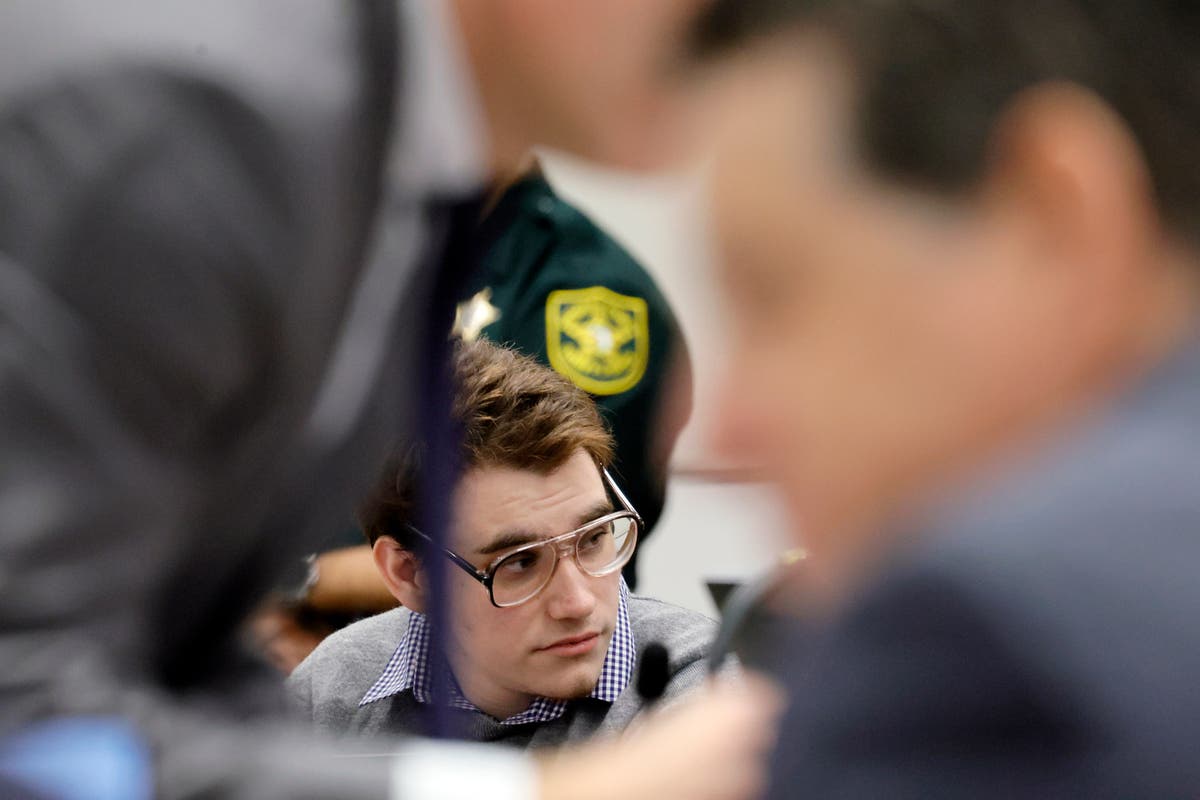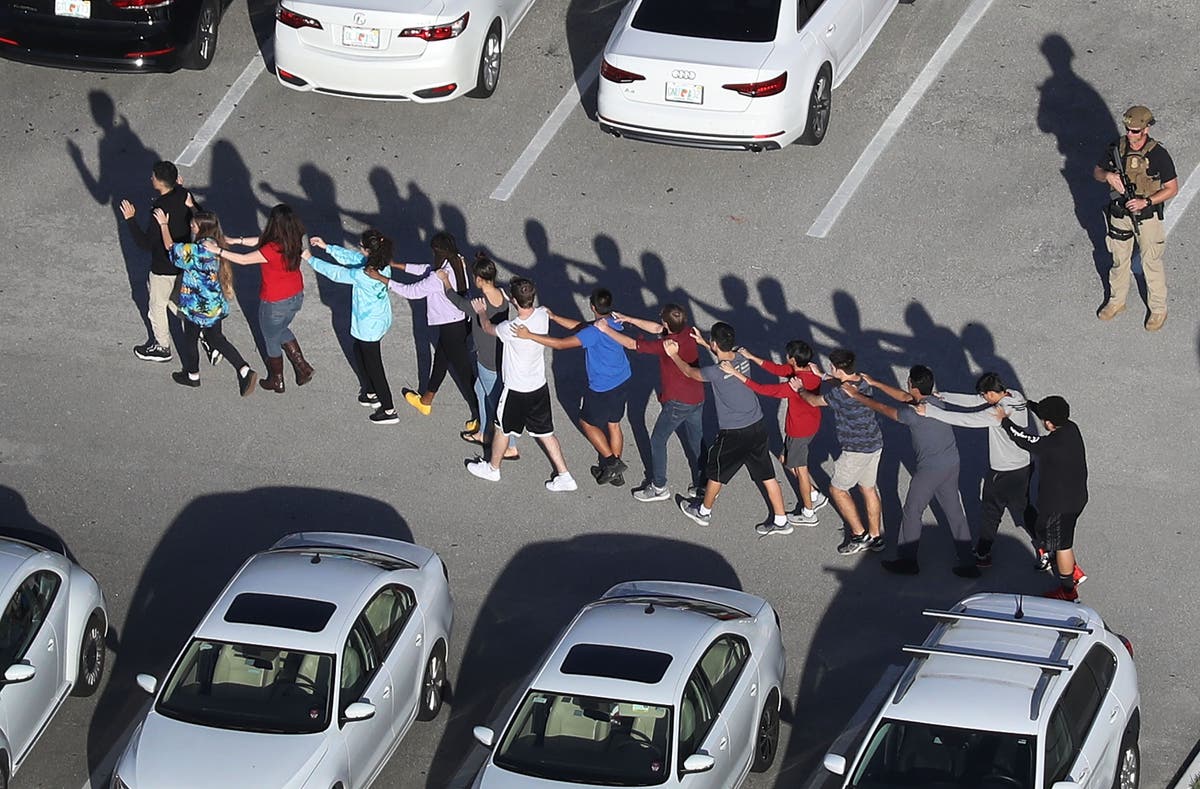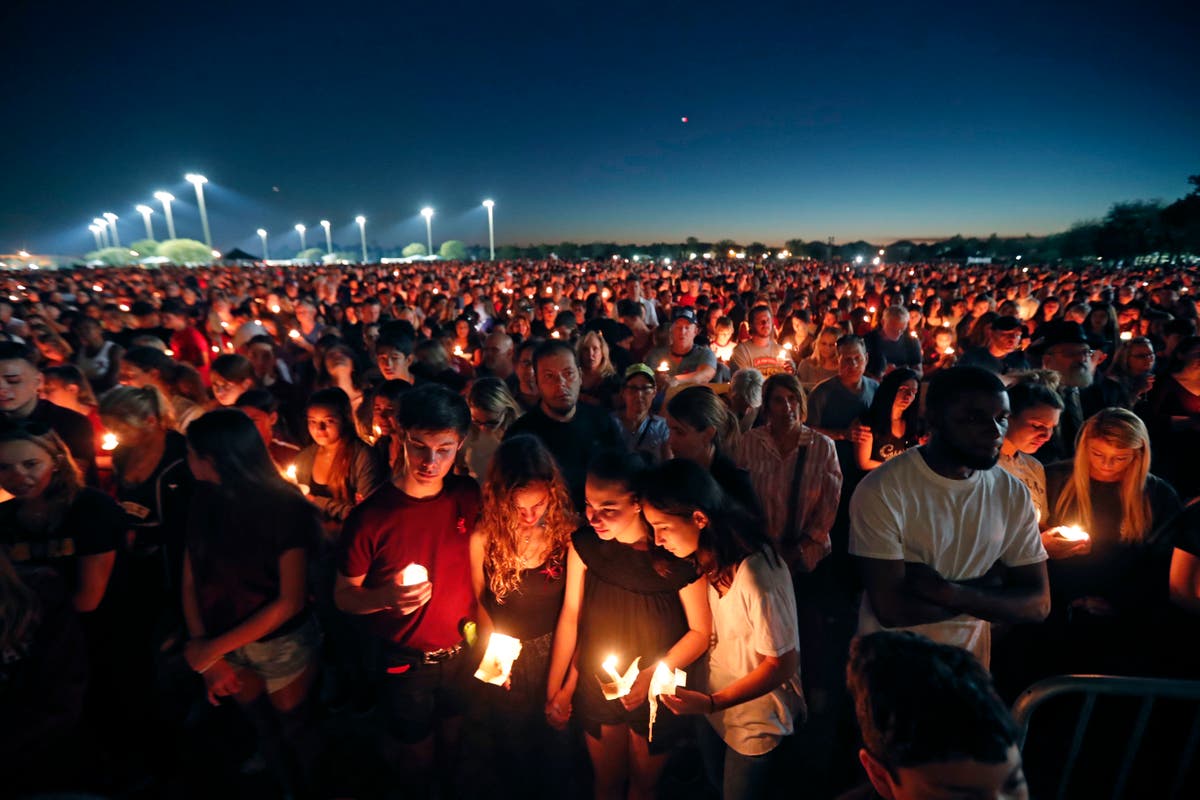Nikolas Cruz sentencing: Parkland trial delayed due to hurricane threat in Florida
The sentencing trial of Parkland shooter Nikolas Cruz is postponed
The sentencing trial of Parkland gunman Nikolas Cruz has been delayed once again as Hurricane Ian continues to strengthen on its path towards Florida.
Judge Elizabeth Scherer postponed the trial until Monday when the state will resume its rebuttal case.
The rebuttal began on Tuesday with witnesses testifying that Cruz’s gun magazine and boots were decorated with swastikas. Jurors were also shown his internet history, including searches for Nazi paraphernalia and child porn as well as racist comments about Black people.
Forensic psychiatrist Dr Charles Scott then detailed how he disgnosed Cruz with antisocial personality disorder. Antisocial personality disorder, also known as sociopathy, is a mental disorder where ab individual consistently shows no regard for right and wrong, ignores the rights and feelings of others and shows no remorse for their actions, according to the Mayo Clinic.
Jurors were shown video clips from Dr Scott’s interviews with Cruz back in March 2022 as evidence of how he reached his diagnosis. In the clips, the mass shooter tries to claim that he placed swastikas on his items as a symbol “of peace” and describes how he skinned and burned lizards alive from the age of four.
The state is seeking to show that Cruz is a sociopath who planned his attack and has no remorse for murdering 17 victims – challenging Cruz’s defence that fetal alcohol spectrum disorders led him to carry out one of the worst mass shootings in American history.
On Valentine’s Day 2018, Cruz, then 19, travelled to Marjory Stoneman Douglas High School with an AR-15 and gunned down students and staff.
In October, Cruz, now 24, pleaded guilty to 17 counts of murder and 17 counts of attempted murder.
Jurors will now decide whether to sentence him to death or to life in prison.
Nikolas Cruz had a horror start to life but does it matter in trial?
It began before he was even born: Nikolas Cruz’s biological mother drank alcohol and abused drugs while he was still in the womb.
At the age of five, his adoptive father suddenly collapsed and died in front of him in the family home. In his teenage years, he was allegedly bullied by his brother and sexually abused by a so-called “trusted peer”. At 19, he became an orphan when his adoptive mother died from pneumonia.
And just three months later, he murdered 17 innocent students and staff in a shooting rampage at his former high school.
“Without any one of those problems, it may never have happened,” Abigail Marsh, professor in the Department of Psychology and the Interdisciplinary Neuroscience Program at Georgetown University, tells The Independent.
“For any given person there is a causal explanation, a link… and, on average, people who become mass shooters or are very violent have had these experiences or risk factors. There’s no one thing that you can say that is the reason but, together, a perfect storm of risk factors can give the means, motive and opportunity.”
These so-called risk factors have all come into focus in recent weeks as Cruz’s team of public defenders tries to convince a jury of his peers that his life should be spared.
The Independent’s Rachel Sharp details what jurors have learned about Cruz’s start in life and speaks to a psychologist and criminal defence attorney about what impact this truly had on him committing his crime and whether or not it will make any difference in the eyes of the jury:

Parkland shooter Nikolas Cruz may have had a horror start to life but does it matter?
Jurors are learning more about the early life of Parkland shooter Nikolas Cruz from his apparent exposure to alcohol in the womb, the deaths of his adoptive parents and his behavioural and emotional problems. But will it make any difference in their decision to sentence him to life in prison or to death? Rachel Sharp reports
What we’ve learned so far in the trial:
On Valentine’s Day 2018, Cruz traveled to Marjory Stoneman Douglas High School armed with an AR-15-style rifle.
There, the then-19-year-old stalked all three floors of the freshman building, shooting and killing 17 students and staff members.
Cruz, now 23, pleaded guilty in October 2021 to 17 counts of murder and 17 counts of attempted murder.
Now, the jury will decide whether to hand him the death penalty or to sentence him to life in prison without the possibility of parole.
Here’s what we’ve learned so far in the trial:

Nikolas Cruz’s sentencing trial: What we’ve learned so far
Jurors are weighing whether to sentence Cruz to life in prison or to death for carrying out one of the worst school shootings in American history
ICYMI: Chilling jailhouse drawings by Nikolas Cruz
Chilling jailhouse drawings and notes have revealed Nikolas Cruz saying he wants to “go to death row” and then be “buried with a woman who had a s***ty life like me”.
The disturbing sketches and ramblings were scrawled by the mass murderer while he is being held behind bars in Broward County Jail.
In the 30 pages of incoherent ramblings, the 23-year-old has drawn disturbing images of the devil and pictures appearing to depict the Valentine’s Day 2018 shooting at Marjory Stoneman Douglas High School.
He also blames others for his decision to murder 17 innocent victims in the attack, speaks of his hatred for BSO and says he wants to be dead.
Some of the notes also appear to have been written in blood.
The Independent’s Rachel Sharp has the full story:
Remembering the victims of Parkland
Seventeen students and staff members were murdered in the mass shooting at Marjory Stoneman Douglas High School on Valentine’s Day 2018.
The 14 students killed were: Alyssa Alhadeff, Martin Duque, Nicholas Dworet, Jaime Guttenberg, Luke Hoyer, Cara Loughran, Gina Montalto, Joaquin Oliver, Alaina Petty, Meadow Pollack, Helena Ramsay, Alex Schachter, Carmen Schentrup and Peter Wang.
The three adults killed were: Scott Beigel, Chris Hixon and Aaron Feis.
Debbi Hixon, who should have recently celebrated her 32nd wedding anniversary with her husband Chris, told The Independent ahead of the start of the trial that the trial is a way for people to hear the stories of each of the people who were killed that day.
“People say the 17 parents and the 17 students [when they talk about Parkland],” she said.
“People don’t know the story of each individual who was lost and, for us who lost them, that’s the story. And it’s frustrating that it isn’t about those who were lost.”
She adds: “All the 14 beautiful children and three adults that were lost. They all have their own story.”
Here are their stories:

Parkland victim’s widow speaks out as victims remembered
Chris Hixon was murdered along with 16 other people in the mass shooting at Marjory Stoneman Douglas High School on Valentine’s Day 2018. His widow Debbi Hixon tells Rachel Sharp how she hopes the sentencing trial of his killer will finally enable her family to start to grieve
What are fetal alcohol spectrum disorders (FASD)?
One of the key parts of the defence’s argument is that he suffers from fetal alcohol spectrum disorders (FASD) caused by his biological mother abusing alcohol and drugs while pregnant.
FASDs are conditions caused by an individual being exposed to alcohol in the womb before birth.
According to the CDC, alcohol is passed from the mother’s blood to the baby via the umbilical cord.
It is surprisingly common, occurring in up to 1 in every 20 people, according to FASD United.
The effects of FASD can vary but typically include both physical problems and behavioural and learning problems.
Signs and symptoms include: learning disabilities, small head size, hyperactive behaviour, poor reasoning and judgment skills, difficulty in school and intellectual disability, among other things.
The Independent’s Rachel Sharp has the full story:

Nikolas Cruz: What are fetal alcohol spectrum disorders?
Fetal alcohol spectrum disorders (FASD) are conditions caused by an individual being exposed to alcohol before birth
Missed warning signs: What went wrong at Parkland
Almost 70 documented incidents of violence by age 19. Boasts online of being “the next school shooter”. Tips about threatening behaviour ignored by the FBI. Unlocked and unmanned gates at the school. Students and staff left to wander hallways while no active shooter alert was made. A school resource officer who hid from the gunfire for more than 45 minutes.
Nearly everything that could have gone wrong that day did.
While the survivors and families of the victims have waited more than four years for their day in court, some changes in gun laws and school safety measures have come more quickly.
The Marjory Stoneman Douglas High School Public Safety Commission, launched in the aftermath to investigate both the shooting and the response to it, made several recommendations of what must change going forwards.
The investigation found that there were catastrophic errors in the response to Cruz’s actions that day.
And, ahead of the day itself, a whole host of disturbing warning signs had also been ignored about what Cruz would go on to do.
The Independent’s Rachel Sharp has the full story:

Missed warning signs, failings and lessons learned: Nikolas Cruz and Parkland
As the sentencing trial continues for Nikolas Cruz, the man who killed 17 people at Marjory Stoneman Douglas High School in 2018, Rachel Sharp investigates what led up to the massacre and what’s happened since
Witnesses jurors won’t hear from
In a move that caught the entire courtroom off guard earlier this month, Nikolas Cruz’s defence team announced it was resting its case in his sentencing trial.
The 23-year-old mass murderer’s legal team previously said it planned to call around 80 witnesses to the stand as they try to convince jurors to sentence him to life in prison instead of to death.
But, at the start of the court session on 14 September, Cruz’s lead attorney Melisa McNeill suddenly revealed that the defence was resting – after calling only around 25 witnesses.
While the bombshell announcement instantly plunged the courtroom into chaos, it also meant jurors would no longer hear from several widely-anticipated witnesses.
Here are some of the key witnesses who had been expected to testify:

Nikolas Cruz trial: Key witnesses jurors won’t hear from after defence rested case
With the defence resting, jurors will no longer hear from several widely anticipated witnesses
Timeline of the Parkland massacre
Nikolas Cruz, the man convicted of shooting dead 17 people and injuring 17 others at Marjory Stoneman Douglas High School in Parkland, Florida, on 14 February 2018, is now facing a sentencing trial for his crimes.
Cruz – a former student at the institution who was a member of its air rifle team and had a lengthy disciplinary record – was just 19 when he arrived that day in an Uber bearing a legally-purchased AR-15 semi-automatic rifle and gunned down 14 students and three members of staff in what proved to be one of the deadliest school massacres in American history.
He was arrested later that day by police and pleaded guilty to 17 charges of first-degree murder and 17 of attempted murder, his actions sparking a nationwide protest movement demanding tighter gun control measures and an unsavoury political debate in which survivors of the attack including David Hogg and Emma Gonzalez were accused of being paid “crisis actors” by conspiracy-minded members of the right-wing commentariat.
Here’s a timeline of the massacre:

A timeline of the Stoneman Douglas High School shooting
Former student finally facing judgement for attack that killed 17 people and wounded 17 others in Parkland, Florida, on 14 February 2018
What is antisocial personality disorder?
In the rebuttal, prosecutors are seeking to challenge Nikolas Cruz’s defence that behavioural and psychological issues, including fetal alcohol spectrum disorders (FASD) led him to carry out the massacre.
Instead, they are arguing that he has antisocial personality disorder and so he planned his attack and has since shown no remorse for his actions.
Antisocial personality disorder is a mental disorder where the individual consistently shows no regard for right and wrong and ignores the rights and feelings of others, according to the Mayo Clinic.
Often referred to as sociopathy, people with the disorder often break the law and engage in criminality, commit acts of violence, lie and abuse alcohol and drugs.
They show no guilt or remorse for their behaviour.
Early symptoms include behavioural problems such as aggression toward people and animals, stealing, destroying property and deceitfulness. Typically, adults with the disorder will have begun showing signs and symptoms of the disorder before the age of 15.
What we’ve learned so far in the trial:
On Valentine’s Day 2018, Cruz traveled to Marjory Stoneman Douglas High School armed with an AR-15-style rifle.
There, the then-19-year-old stalked all three floors of the freshman building, shooting and killing 17 students and staff members.
Cruz, now 23, pleaded guilty in October 2021 to 17 counts of murder and 17 counts of attempted murder.
Now, the jury will decide whether to hand him the death penalty or to sentence him to life in prison without the possibility of parole.
Here’s what we’ve learned so far in the trial:

Nikolas Cruz’s sentencing trial: What we’ve learned so far
Jurors are weighing whether to sentence Cruz to life in prison or to death for carrying out one of the worst school shootings in American history





